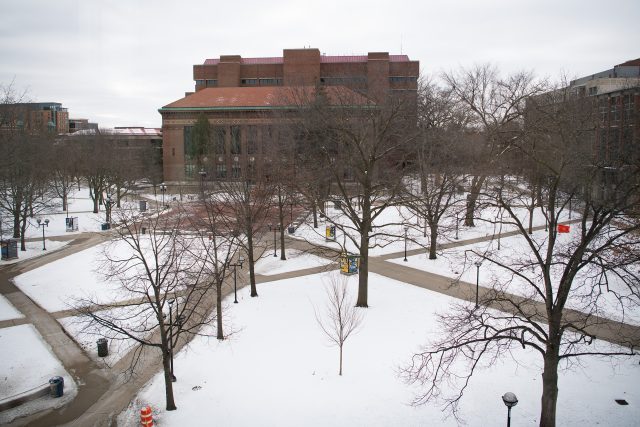[ad_1]
I read, with some incredulity, the statement sent out on Aug. 31 to the University of Michigan community by University President Santa Ono, University Provost Laurie McCauley and Martino Harmon, the University’s vice president of student life. The message represents their attempt to define the parameters of permissible protest on campus and to justify shutting down a recent pro-Palestine demonstration on the Diag, which resulted in four arrests.
I was not particularly surprised that this message didn’t mention that one of the four individuals arrested, the 16-year-old child of a U-M professor, ended up in the emergency room because of police mistreatment. Nor was I surprised that the authors of the message saw no irony in clamping down on protests while simultaneously trying to kick off the University’s so-called “Year of Democracy and Civil Engagement.”
Instead, I was struck by their insistent use of the pronoun “our” throughout the statement, and wondered who that “our” really was. It was certainly not the “our” of the U-M community. The collective voice of that community — faculty, students, staff and alumni — rang out loudly and sharply against measures changing the rules on engagement and protest when the University first tried to institute the Disruptive Activity Policy last spring.
I could only conclude that the “our” in the message referred solely to the upper U-M administration and the U-M Board of Regents — the ones who unilaterally imposed new rules and regulations for public demonstrations and gatherings in the middle of the summer without consulting or discussing with the community. Thus, I concluded that these are not “our” rules and regulations; rather, they are “theirs,” imposed on members of the U-M community without consultation or consent.
In my mind, “our” rules remain those that have long guided the University through many tense circumstances. “Their” rules reflect a desire to clamp down on legitimate disagreement and protest, and they seek to do so in a manner reflective not of a democratic polity but, sadly, of an authoritarian state.
New regulations have been promulgated with no broad input from the community. Armed police have been used to suppress any dissent that the administration or even unnamed individuals with no real connection to the University deem “inappropriate.” Basic protections for those accused of some violation of the new regulations, including the right to an impartial hearing before the community and with an advisor, have been removed. The language of “safety” has been expanded to encompass any action an administrator may not like. These values are being endorsed across the United States and in many parts of the world. They are not, however, “our” values as a university, nor are they the values that any institution of learning should adopt or celebrate.
In authoritarian states, the leaders decide all policies and ruthlessly suppress those who do not meekly obey. Is this really the model that the regents and upper administration now wish to adopt? There is still time for them to turn to the U-M community and engage in an open discussion about speech and dissent on campus. Perhaps the long-standing rules do need some updating. But, that can only occur as the product of a serious campus-wide conversation. It cannot and must not occur under the current, illegitimate rules and regulations. The U-M administration must do better if they have any hope of speaking for the “we” and not the “they.” “Our” community deserves that much respect.
John Carson is an associate professor in the U-M Department of History. He can be reached at jscarson@umich.edu.
Related articles
[ad_2]
Source link











